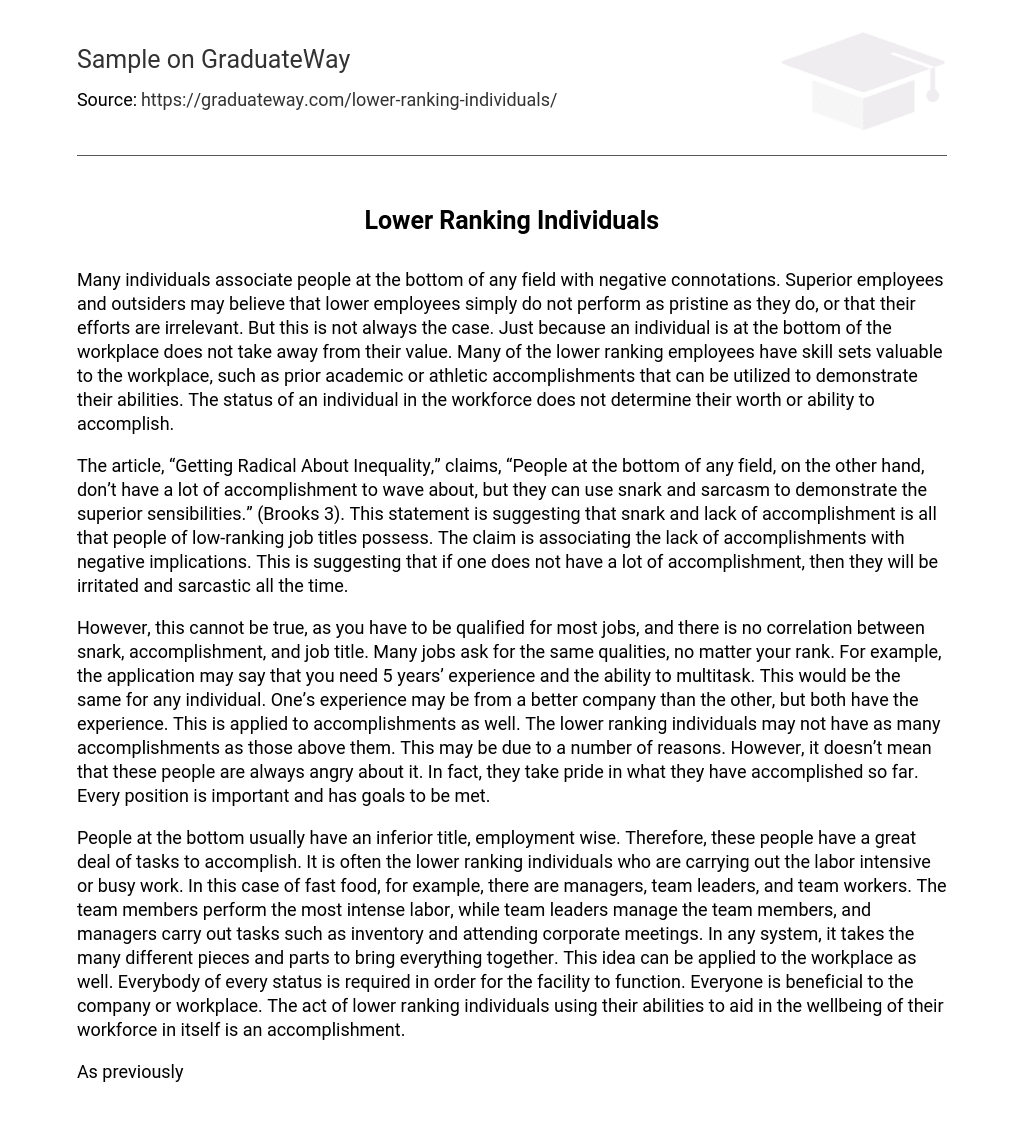Many individuals associate people at the bottom of any field with negative connotations. Superior employees and outsiders may believe that lower employees simply do not perform as pristine as they do, or that their efforts are irrelevant. But this is not always the case. Just because an individual is at the bottom of the workplace does not take away from their value. Many of the lower ranking employees have skill sets valuable to the workplace, such as prior academic or athletic accomplishments that can be utilized to demonstrate their abilities. The status of an individual in the workforce does not determine their worth or ability to accomplish.
The article, “Getting Radical About Inequality,” claims, “People at the bottom of any field, on the other hand, don’t have a lot of accomplishment to wave about, but they can use snark and sarcasm to demonstrate the superior sensibilities.” (Brooks 3). This statement is suggesting that snark and lack of accomplishment is all that people of low-ranking job titles possess. The claim is associating the lack of accomplishments with negative implications. This is suggesting that if one does not have a lot of accomplishment, then they will be irritated and sarcastic all the time.
However, this cannot be true, as you have to be qualified for most jobs, and there is no correlation between snark, accomplishment, and job title. Many jobs ask for the same qualities, no matter your rank. For example, the application may say that you need 5 years’ experience and the ability to multitask. This would be the same for any individual. One’s experience may be from a better company than the other, but both have the experience. This is applied to accomplishments as well. The lower ranking individuals may not have as many accomplishments as those above them. This may be due to a number of reasons. However, it doesn’t mean that these people are always angry about it. In fact, they take pride in what they have accomplished so far. Every position is important and has goals to be met.
People at the bottom usually have an inferior title, employment wise. Therefore, these people have a great deal of tasks to accomplish. It is often the lower ranking individuals who are carrying out the labor intensive or busy work. In this case of fast food, for example, there are managers, team leaders, and team workers. The team members perform the most intense labor, while team leaders manage the team members, and managers carry out tasks such as inventory and attending corporate meetings. In any system, it takes the many different pieces and parts to bring everything together. This idea can be applied to the workplace as well. Everybody of every status is required in order for the facility to function. Everyone is beneficial to the company or workplace. The act of lower ranking individuals using their abilities to aid in the wellbeing of their workforce in itself is an accomplishment.
As previously stated, superiors or outsiders tend to believe that lower employees do not accomplish much and are snarky as a result. This cannot be true, as you have to be qualified for most jobs or at least able to perform well at a required task. There is no correlation between snark, accomplishment, and job title. Anyone can be snarky. Every position is important and has goals to be met. Essentially, the boss has a checklist, and so does the janitor. It is ignorant to assume a person’s ability to accomplish their work duties and personality traits (such as being snarky) based on their positions in their workplaces.
Some may disagree with the argument that accomplishment is not limited to one’s status in the workplace. They may feel as if the higher up you are the harder you’ve worked, hence more accomplishment. A person may feel this way due to the stigma associated with employees at the bottom of many fields. For example, people often respect the doctor more than the nurse, the general manager over the team member, or the CEO over the janitor.
This objection is invalid. Everyone accomplishes goals and works hard no matter the title of their occupation. For instance, a janitor cleans an entire floor or building, and a nurse works the floor with multiple patients. There is no competition of labor. Both the nurse and the janitor are working tediously.
These lower ranking individuals are often portrayed with negative connotations. They are viewed as snarky and sarcastic because they lack the amount of accomplishments seen in those higher up. However, it is completely invalid for one to make such assumptions based on stereotypes and connotations. Although lower ranking, these individuals still have many things they are proud of. The do not go moping around about how they are not always superior. In fact, they often do not even think about that. Instead they do the best they can given their circumstances. Everyone works hard and has something to take pride in. The validity of one’s accomplishments should not be based on their status in the workforce, or any other variables.
Works Cited
- Brooks, David. “Getting Radical About Inequality.” The New York Times, 18 July 2018, https://www.nytimes.com/2017/07/18/opinion/inequality-pierre-bourdieu.html. Accessed 20 November 2018.





